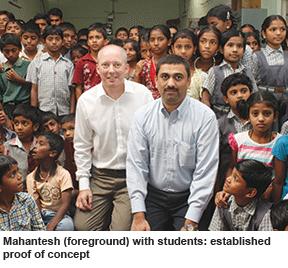Over the past 17 years, this trust has provided free-of-charge vocational education including advanced computer training and English language learning to 18,000 children and youth with disabilities
 Although post-independence India’s record of providing globally comparable quality education to the world’s largest child population (480 million) is pathetic, its record of provisioning special education for the country’s 70 million citizens with physical disabilities and 10 million visually challenged, is worse. Education of the country’s huge population of children and people with disabilities has been — and remains — an area of darkness.
Although post-independence India’s record of providing globally comparable quality education to the world’s largest child population (480 million) is pathetic, its record of provisioning special education for the country’s 70 million citizens with physical disabilities and 10 million visually challenged, is worse. Education of the country’s huge population of children and people with disabilities has been — and remains — an area of darkness.
However, official failure and ignorance about the inherent productive capabilities of challenged people has not deterred several private sector initiatives such as ADAPT (formerly Spastic Society of India), Mumbai, and National Association for the Blind among other NGOs across the country, from taking up the cause of challenged citizens — widely regarded as a societal burden. To the too-slowly lengthening list of NGOs aiding and abetting the development of children and people with disabilities, add the name of Bangalore-based Samarthanam Trust for the Disabled (estb. 1997). Over the past 17 years since it was registered with the mission to “create an inclusive society free from discrimination where persons with disabilities become contributing members, living with dignity and respect”, Samarthanam has provided free-of-charge residential primary and high school education as also advanced computer training, English language learning and personality development and enrichment programmes to 18,000 children and youth with disabilities in the southern state of Karnataka.
Currently, Samarthanam (‘support’), promoted by G.K. Mahantesh, a visually impaired English literature postgraduate and former lecturer of Bangalore University, and childhood friends S.T. Nagesh, a (visually impaired) senior banker at the State Bank of India and Vasanti Savanur, a school teacher, runs two residential schools in Bangalore for 350 challenged and underserved children who are provided K-X education. The trust has also established and manages a hostel-cum-education centre for 1,000 youth and adults with disabilities, promoted a Livelihood Resource Centre which runs on a model that ensures persons with disabilities are skilled for IT/ITES/BPO, retail, hospitality, banking and insurance sectors, and has successfully placed 6,500 disabled youth in remunerative employment.
Moreover it has established the country’s first two BPO training units for challenged children and youth in Dharwad and Bangalore, and runs a BPO unit with 150 employees providing voice and non-voice services to half a dozen companies. “Over the past 17 years, we have educated and trained more than 18,000 physically and visually challenged children and youth for employability. School dropouts are given intensive English learning and IT software language training, and simultaneously taught to develop soft life skills with most of them ready for employment after six months of training,” says Mahantesh, managing trustee of Samarthanam.
Quite obviously, the education and skills training given to children and youth in the trust’s schools and learning centres is effective, because start-up remuneration of Samarthanam graduates averages Rs.8,000 per month and employers include respected corporates such as State Bank of India, Canara Bank, a number of Bangalore’s massive malls, IBM, First Source and several Aditya Birla group companies. “The reports we get about on-the-job learning capabilities of our alumni are very encouraging and many of them are earning Rs.40,000-50,000 per month by now,” exults Mahantesh.
Over the past almost two decades since its promotion, the Samarthanam Trust has grown in terms of size and reach. Schools apart, currently it trains challenged citizens in six owned and eight partnership learning centres in Karnataka, Bokaro (Madhya Pradesh), Lucknow, Bhopal and Patangi (Odisha). The trust’s employees number 350, of whom 100 are teachers and trainers. And since all education and training is provided free of charge, Mahantesh and his team have developed the expertise to raise funds by way of donations, sponsorships and grants.
“Currently our annual budget is Rs.15 crore, admittedly difficult to raise. Therefore the trust has ventured into running sustainable businesses such as our BPO unit in Bangalore, and more recently we have signed a contract with the municipal corporation to manage and recycle some of the city’s solid wastes. These and other business activities under consideration will create new and sustainable income streams for the trust. This is necessary because now that we have established proof of concept, we are determined to scale up our operations countrywide and have set a target of 100,000 graduates by 2020. Given the huge number of people with disabilities in India, we have a long way to go,” says Mahantesh.
God speed!